Capacity Building
The resources below are a curated list of guides, toolkits, and reports focused on the intersection of equity, food systems, government, or policy. These resources offer guidance on how food policy councils can advance equity through organizational processes and decisions, work with government, transformational civic engagement, and assessment of their actions and decisions to reckon with the role of race and power in the food system. For FPCs interested in a training to build their understanding of personal bias or institutional and structural racism and inequity, check out this review of Training for Racial Equity and Inclusion: A Guide to Selected Programs by Project Change Anti-Racism Initiative and The Aspen Institute.
Resources on racial equity in the food system abound. But in compiling the list below, we confronted a lack of tools and guides for work at the intersection of food systems, policy and youth, gender, religion, sexual preference, or physical ability. Like food systems, discrimination is complex. Historically and structurally, racism has influenced policies that inhibit, prohibit, and exclude people of color from equitably participating in the food system, and those policies persist today. Two examples—although there are many more—include (1) the exclusion of people convicted of drug felonies from participation in SNAP and (2) heirs’ property laws that threaten the generational transfer of land, particularly for black-owned land. As a result of policies like these, which are influenced by racism, communities of color are more likely to experience food insecurity, live in poverty, attain lower levels of education, receive lower wages, be incarcerated, or be exposed to environmental toxins. Our collective efforts to break down barriers based on race can serve as a bridge to addressing inequities in other marginalized communities, such as women, people that identify as LGBTQ, returning citizens, immigrants, and people of non-Christian religions.
Guides and Tools
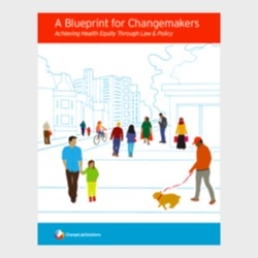
A Blueprint for Changemakers: Achieving Health Equity Through Law & Policy (ChangeLab Solutions)
The Blueprint is a guide for policymakers, practitioners, and communities on working locally and collaboratively to advance laws and policies that will help ensure that everyone has a fair chance to live a healthy life. The Blueprint covers a variety of topics, including the connection between local, state, and federal authority; the dangers of preemption and structural discrimination; and community engagement to solve community problems.
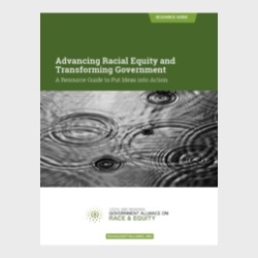
Advancing Racial Equity and Transforming Government: A Resource Guide to Put Ideas into Action (Government Alliance on Race and Equity)
To achieve racial equity, government needs a comprehensive strategy to introduce and conduct regularly occurring conversations about race, put new policies into practice, shift culture within organizations, and organize to achieve racial equity. This guide outlines six successful strategies for local governments to advance racial equity, including stories and lessons learned from local government leaders.
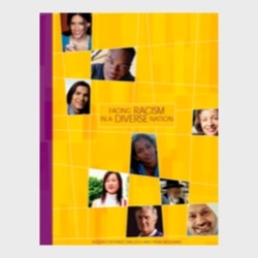
Facing Racism in a Diverse Nation (Everyday Democracy)
A guide on how to facilitate a six-session series of community-wide conversations to examine gaps among racial and ethnic groups and create institutional and policy change.
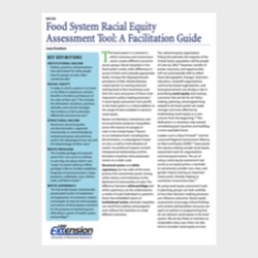
Food System Racial Equity Assessment Tool: A Facilitation Guide (Lexa Dunmore, University of Wisconsin-Extension)
This tool can be used to assess the impact of food systems programs, policies, or plans on racial equity goals from the perspectives of people, place, process, and power. This tool focuses on organizational decision making and the programs proposed by an organization.
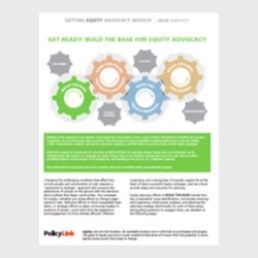
Getting Equity Advocacy Results (PolicyLink)
This toolkit provides benchmarks, frameworks, and tools for measuring progress in equity efforts for policy change across a range of issues. The toolkit focuses on four stages of equity advocacy and ways to promote community inclusion through organizing, capacity building, research, and communications. The toolkit also includes strategies for assessing an equity advocacy campaign.
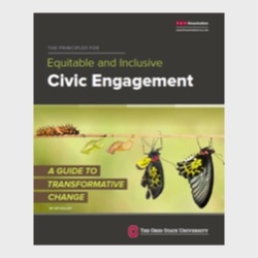
Principles For Equitable And Inclusive Civic Engagement: A guide to transformative change (Kirwan Institute at The Ohio State University)
This guide provides a roadmap for community leaders, policymakers, planners, and community developers to engage in community dialogue that reflects the diverse voices in communities, considers the assets of traditionally marginalized or underrepresented community members, and contributes to sustainable, diverse, equitable and healthy communities. Pulling from several case studies and real-world examples, this guide shows how to transform the civic environment from one of exclusion and mistrust to one of trust and optimism.
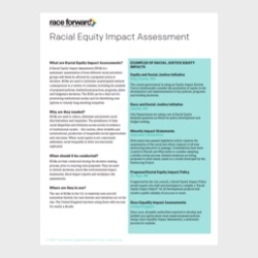
Racial Equity Impact Assessment Toolkit (Race Forward)
A tool to systematically examine how a proposed action or decision will likely affect different racial and ethnic groups. This tool can be vital for preventing institutional racism by helping to minimize unanticipated adverse consequences and identifying new options to remedy long-standing inequities.
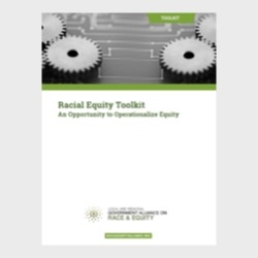
Racial Equity Toolkit: An opportunity to operationalize equity (Government Alliance on Race and Equity)
A racial equity tool for government to integrate explicit consideration of racial equity into policies, practices, programs and budgets to reduce racial inequities and improve success for all groups.
Webinar: Elevating The Community's Voice Roundtable Discussion (Center for a Livable Future)
This webinar highlights effective strategies and lessons learned from food policy councils for working with diverse representation to prioritize food systems issues and solutions most appropriate to communities.
Reports
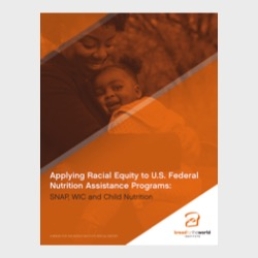
Applying a Racial Equity Lens to End Hunger (Bread for the World Institute)
This report is the first-ever analysis of how key federal nutrition programs can apply racial equity principles to reduce the disproportionate impact of food insecurity on people of color. The report provides recommendations for reducing racial inequities in the federal nutrition program and case studies on how community members are effectively applying a racial equity lens.
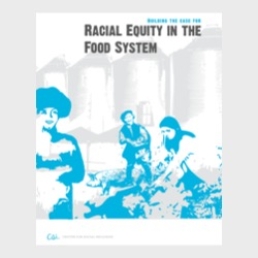
Building the Case for Racial Equity in the Food System (Center for Social Inclusion)
This report shares an analysis of what it means to build a racially equitable food system – from field to farm to fork – and lays out steps toward achieving that goal.
Food Policy For All: Inclusion Of Diverse Community Residents On Food Policy Councils (Tufts University and Center for a Livable Future)
This report covers the ways in which food policy councils include community members whose lives are directly affected by food systems policies and programs in setting the agenda and making decisions. It examines the techniques used by FPCs to include community members and the challenges facing food policy councils in the inclusion of community members.
Putting Equity at the Center: The Opportunity Youth Forum (The Aspen Institute)
This report emphasizes the role that equity plays in efforts to build and deepen the education and employment opportunities for youth. It outlines four strategies that focus on equity to improve outcomes for youth: create a culture of equity across the local community; use disaggregated data to document and track disparities; focus on priority populations to address the effects of structural inequity; and challenge existing institutionalized barriers.
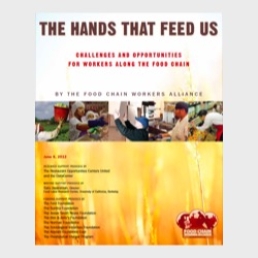
The Hands That Feed Us: Challenges and Opportunities for Workers Along the Food Chain (The Food Chain Workers Alliance)
This report examines how corporate consolidation affects workers in five core food occupations and industries (farmworkers, slaughterhouse and other processing facilities workers, warehouse workers, grocery store workers, and restaurant and food service workers). The report highlights fair business practices and policy recommendations to improve conditions for food system workers.
Databases
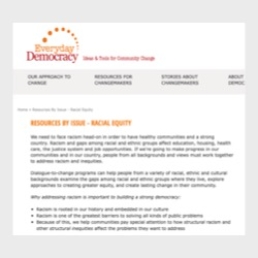
Everyday Democracy Racial Equity Resource Database
This database includes discussion guides, handouts and worksheets, how-to handbooks, and reports to help people from a variety of racial, ethnic, and cultural backgrounds examine the gaps among racial and ethnic groups where they live, explore approaches to creating greater equity, and create lasting change in their community.
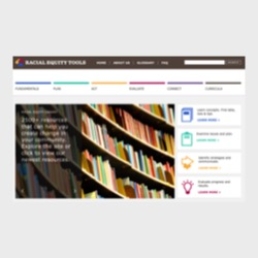
Racial Equity Tools
This website offers tools, research, tips, curricula and ideas for individuals and organizations that want to increase their own understanding of racial equity and to help those working toward justice at every level – in systems, organizations, communities, and the culture at large. The site also includes a section on evaluation focused on how to document, learn from, and assess racial equity work.
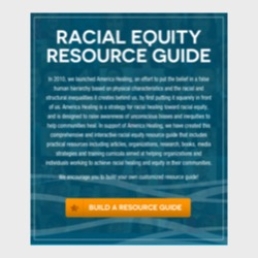
Racial Equity Resource Guide (W.K. Kellogg Foundation)
A comprehensive and interactive compliation of racial equity resources that allows the user to build their own resource guide. The tool contains a collection of articles, books, media strategies and training curricula for organizations and individuals on how to achieve racial healing and equity in their communities.
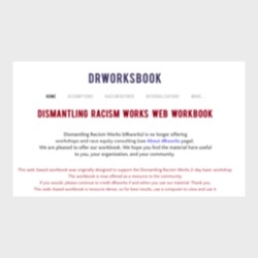
Dismantling Racism Works Web Workbook
This is a web-based version of a workbook designed originally to support the Dismantling Racism workshop offered by Dismantling Racism Works. It includes tools to help individuals and organizations to understand the dynamics of denial about racial oppression, to explore the stages of racial equity and movement building, as well as to develop explicit goals and take action.

